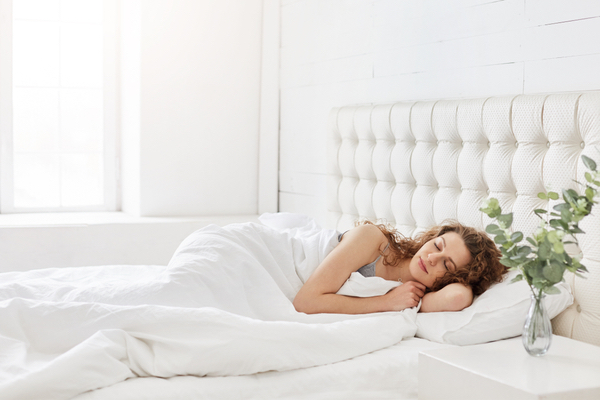With World Sleep Day taking place this Friday 13 March, we’ve rounded up our top 10 tips on how to improve your sleep quality…
Use nature’s tranquiliser
‘Sleep, stress and anxiety are all related. If you don’t get enough sleep you can find it difficult to adapt to challenging situations, and when you can’t cope with stress, it can affect your sleep,’ says Martina Della Vedova, nutritionist at Nature’s Plus (naturesplus.co.uk). Magnesium, known as ‘nature’s tranquiliser’, relaxes muscles, which helps you to fall into a peaceful sleep. ‘Include magnesium-rich foods in your diet such as fish, pumpkin and sunflower seeds, and leafy green vegetables,’ says Martina. ‘I’d also recommend KalmAssure Magnesium Powder (£24.50, naturesplus.co.uk).’
Create a routine
Bedtime routines are helpful for good sleep. ‘Aim to go to bed at the same time and get up at the same time every day,’ says Dr Marilyn Glenville, author of The Natural Health Bible for Women (marilynglenville.com). ‘A cup of herbal tea, such as chamomile, an hour before bed can begin your routine. And getting up at the same time is most important.’
Balance your blood sugar
If you wake with night sweats, first get clear about the cause. ‘If the sweat wakes you up, you may be having a menopausal hot flush but if you wake up and then start to sweat and/or get other symptoms such as palpitations, anxiety or just feel wide awake, this could be caused by an adrenaline surge due to low blood sugar,’ says
Dr Glenville.
‘If this is the case, it’s important to balance your blood sugar during the day. Also, have a small snack of complex carbs, such as an oatcake, or half a slice of wheat or rye bread, about an hour before bed.’
Try CBD oil
Studies show that CBD oil has a stabilising effect on mood and can help maintain homeostasis in your body, including regulating your sleep. ‘The oil can improve sleep quality and deter the overthinking that can occur in the early hours of the morning,’ says nutritionist Alix Woods. ‘Insomniacs may find it helpful and it can also help those in pain to sleep better too as it acts as a natural analgesic.’
Drop CannabiGold Terpenes+ 250MG CBD oil (£24.99, bionativa.co.uk, available Jan) under your tongue. ‘The liquid passes through the membranes of the mouth, directly into your bloodstream, meaning it works straight away,’ says Alix. Find out more about CBD in the Feb issue.
Steer clear of stimulants
Chocolate, coffee, most teas and caffeinated soft drinks can rev you up when you want to calm down for the night. ‘Some women find they can’t drink any caffeine after lunch as it affects them in the evening, while others are even more sensitive and can react to even one cup of coffee in the morning. ‘You need to experiment to see whether caffeine is affecting you and how much,’ says Dr Glenville. Keep a diary for the next week of how many cups you drink and when.
Keep your bedroom beautifully blissful
Make sure your room is not too warm nor too cold. Cooler is better than warmer though. Also, invest in a good bed as well. If your mattress is more than 10 years old it may need replacing. You can download sleep guidelines from sleep and wellbeing experts Mammoth (mammothcomfort.com/topsante), which have been developed in partnership with the Chartered Society of Physiotherapy. In the guidelines you can find out more about ideal sleeping positions, bedtime routine essentials and good sleep hygiene.
Avoid exercising too late
Exercising is a great way to relieve stress as it releases feelgood chemicals, but don’t do it too late in the day. ‘Exercise can be stimulating and some find it difficult to sleep after a late workout,’ says Dr Glenville.
Use essential oils
‘What you breathe in can affect how you sleep. Lavender has been shown to decrease heart rate and blood pressure, whilst inducing a more relaxed state. Incorporate lavender oils, candles or pillow sprays into your relaxing bedtime routine,’ suggests Lily Soutter.
Avoid blue light
‘Blocking blue light before bed can transform sleep. Blue light from laptops, phones, iPads and TVs can trick your brain into thinking it’s daytime. This can disrupt your brain’s natural sleep-wake cycle, leading to a poor night sleep,’ says nutritionist Lily Soutter (lilysoutternutrition.com).
Clear your mind
The new mindfulness toolkit from ThinkWell-LiveWell (£8 per month, thinkwell-livewell.com) has numerous programmes to help support a healthier and happier you. The Well in Body category focuses on physical wellbeing and healthy habits, and there you’ll find four programmes to support sleep, including ‘Sleep Like a Baby’ to encourage a deep, sound sleep.
If you want to know how to tweak your bedroom to improve your sleep, click here.







